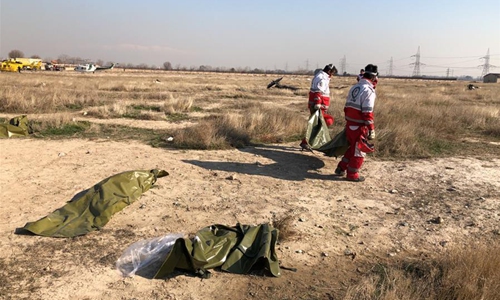HOME >> WORLD
Passenger plane crash shall not be catalyst for next US-Iran conflict: US expert
By Hu Yuwei and Bai Yunyi Source: Published: 2020/1/11 19:15:10

Photo:Xinhua
Ukrainian passenger plane's tragic explosion shall not be a catalyst for the next conflict between the US and Iran, said Richard Weitz, an expert on US defense reforms and policies concerning the Middle East at the Israel-based geostrategic consultancy Wikistrat. Previously, he held key positions at the US Department of Defense.
Weitz believes though there's a possibility that the US will withdraw its troops from Iraq, a lot of uncertainty persists about the political future in the Middle East.
Iranian government admitted on Saturday that its missiles misfired and shot down the Ukraine passenger plane due to "human error" that cause the loss of 176 innocent people onboard.
"I think it reminds us how easy it is to make these mistakes in a crisis," Weitz told the Global Times.
"There is not an incentive on either side to escalate," Weitz told the Global Times, adding that "aircraft downing will not play a role in the now completed exchange of fire, though the broader issue is how is this recent military clash going to affect the dynamics in the Middle East furthermore."
Iraq Prime Minister Adel Abdul Mahdi said he had asked US Secretary of State Mike Pompeo to send a delegation to Baghdad to prepare for the withdrawal of American troops, The New York Times reported on Saturday. But the Trump administration rejected Mahdi's call.
Weitz believes that the retraction of American troops is only a question of timing.
"I don't think that the US will stay in Iraq for 50 years like we were doing in Korea. So I think that they will leave. But they're not gonna leave if they're forced out. It has to be a negotiated settlement between Iraq and the US, and it depends on the next Iraqi government," said Weitz.
The Iraqi caretaker prime minister does not have the authority to terminate the executive agreement that keeps the US forces in Iraq, Weitz noted.
A negotiated withdrawal plan is acceptable, but it needs to be discussed with the next Iraqi prime minister. Whoever be the next US president after this year's election will also be a key factor in impacting US's future decision.
But Weitz predicts the dispute between the US and Iran in Iraq is highly likely to continue even if the US troops leave.
Weitz does not see the US withdrawing its forces from the whole of the Middle East, considering its military bases in other places across the region. Following the assassination of Iranian general Soleimani by a US drone airstrike a week ago, some Iranian government officials warned that the "end of US malicious presence in West Asia has begun".
Posted in: MID-EAST